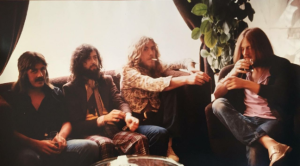
Led Zeppelin – Thank You: A Song of Gratitude and Reflection
In the realm of rock music, Led Zeppelin stands as a towering figure, their music a fusion of blues, hard rock, and folk that has captivated listeners for generations. Among their extensive repertoire, “Thank You” stands out as a poignant and heartfelt ballad, a testament to the power of gratitude and the importance of reflection amidst the relentless pace of life.
Released in 1969 as the closing track of their seminal album Led Zeppelin II, “Thank You” marked a departure from the band’s heavier, blues-driven sound. Instead, it embraced a softer, more introspective tone, showcasing the band’s versatility and their ability to craft songs that resonated on an emotional level.
The song’s opening notes, a gentle acoustic guitar riff, set the stage for Robert Plant’s emotive vocals as he expresses his gratitude to those who have supported him throughout his life. The lyrics are simple yet profound, conveying a deep sense of appreciation for the people and experiences that have shaped him.
Plant’s vocals are the heart and soul of the song, his voice imbued with a sincerity and warmth that resonates with listeners. He delivers each line with feeling, conveying the depth of his emotions and the weight of his gratitude.
The song’s arrangement is understated yet elegant, featuring a delicate interplay of acoustic guitar, piano, and strings. This restrained approach allows the focus to remain on Plant’s vocals and the heartfelt message of the lyrics.
“Thank You” has become a cherished staple of Led Zeppelin’s live performances, often serving as a poignant conclusion to their concerts. The song’s message of gratitude and reflection resonates with audiences of all ages, offering a moment of pause and appreciation amidst the energy and excitement of a rock concert.
Video
Here are some additional details about the song:
- The song was written by Jimmy Page and Robert Plant.
- It was released in 1969 as the closing track of the album Led Zeppelin II.
- “Thank You” has been covered by numerous artists, including Elton John, Bonnie Raitt, and Jeff Beck.